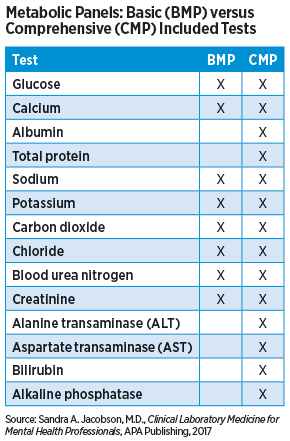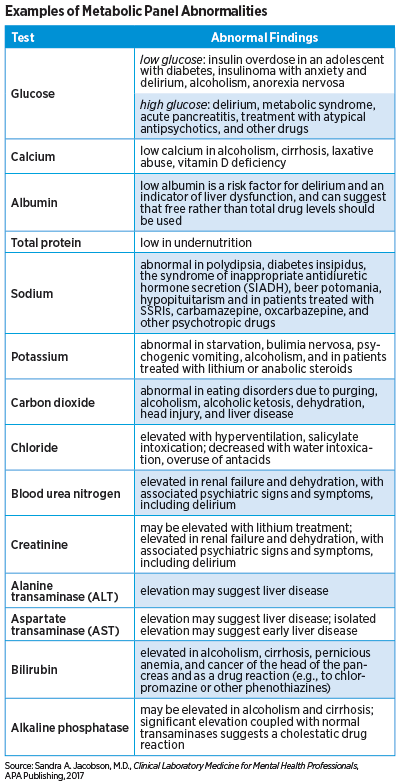Metabolic panels are bundled tests of blood chemistries performed to supplement the physical evaluation of psychiatric patients. Two versions are in common use: the Basic Metabolic Panel (BMP) and the Comprehensive Metabolic Panel (CMP). Older, now outdated names for these panels include SMA and SMAC (for example, SMA-7, SMAC-20). It is important to distinguish the metabolic panel from laboratory tests used to diagnose the metabolic syndrome. The only test on the panel that could assist in diagnosing the syndrome is the glucose assay, which for practical reasons may not be performed in the fasting state.
Both the BMP and the CMP can provide a rapid assessment of the patient’s acid/base status, kidney function, electrolytes, and glucose levels. The CMP, in addition, provides data on liver function and proteins. The small table on the facing page lists individual tests included in each panel. The analyses are automated, and both test panels can be ordered on a stat basis, although in some laboratories, only the BMP is performed stat. Turnaround time can be as little as an hour, or even less in some laboratories.
Optimal patient preparation for metabolic panel testing would include overnight fasting for standardization of the glucose assay, although this rarely is achieved in practice. If possible, the patient should withhold mineral-containing supplements for 12 hours and avoid vigorous exercise.
Indications for the metabolic panel in psychiatry include hospital admission, mental status changes in a hospitalized patient, screening evaluation for starting a new psychotropic medication, monitoring for adverse effects of psychotropic medication, and routine health assessment for patients with chronic illness for whom the psychiatrist serves in a primary care capacity. For these indications—and for psychiatric practice in general—the CMP is preferred to the BMP because of the inclusion of both liver function tests and proteins. Often, the cost of the CMP bundle is insignificantly more than the BMP bundle, as discussed below.
The CMP returns considerable information useful in the care of psychiatric patients. Patterns of abnormalities among several tests can suggest metabolic derangement or organ dysfunction. Examples include low albumin and elevated transaminases (AST and ALT) suggesting liver disease; low albumin, elevated creatinine, and elevated blood urea nitrogen suggesting kidney disease; and low calcium, low albumin, and low protein suggesting alcoholism, possibly covert. Meaningful abnormalities in individual tests can result as well, with examples listed in the large table at right. Note that the list is not by any means exhaustive.
CMP results can be critical in identifying drug reactions. In a patient recently prescribed a psychotropic drug, the clinician is able to determine whether criteria for Hy’s Law are met:
•
AST or ALT ≥ three times the upper limit of normal and
•
Bilirubin ≥ two times the upper limit of normal and
•
No elevation in alkaline phosphatase (and no other reason for liver injury).
In this case—where Hy’s criteria are met—a hepatotoxic drug reaction is suspected. A cholestatic drug reaction, in contrast, may be suspected in the following case:
•
Alkaline phosphatase > three times the upper limit of normal, and
•
AST and ALT levels normal or only minimally elevated.
The albumin level assists the clinician in deciding what to order when a psychotropic level is needed. When the albumin level is low, the unbound percentage of the psychotropic is high, and a measured concentration of total drug can underestimate the amount of drug acting on target organs. In such a case, the patient could develop symptoms of toxicity at apparently therapeutic levels. Free drug levels, which are available for many psychotropics, can be helpful in this situation.
The Health Care Blue Book lists prices for the BMP ($22) and CMP ($28), but prices vary considerably, both regionally and from one laboratory to another. For example, at a respected health care facility in Scottsdale, Ariz., the self-pay charge for the BMP is $211 and for the CMP $276. The charge for venipuncture is $26. At one of the nearby direct-access laboratories (“walk-in labs”), the charge for the BMP is $29 and for the CMP $39 with no additional venipuncture fee. In general, it is more expensive to get the lab work done at a hospital or clinic and less expensive to get it done at an independent laboratory.
The so-called “direct access laboratories” perform venipuncture and return metabolic panel results even without a physician’s order. In general, turnaround times are longer for these laboratories, on the order of 48 to 72 hours. All laboratories are required to meet the same regulatory standards.
The comprehensive metabolic panel is a high-yield, low-cost test representing a test of choice in the care of psychiatric patients. Health insurance coverage notwithstanding, it may be necessary for doctors and patients to perform their own investigations of local laboratory charges to determine where testing should take place. ■
More information on
The Health Care Blue Book can be accessed
here.



